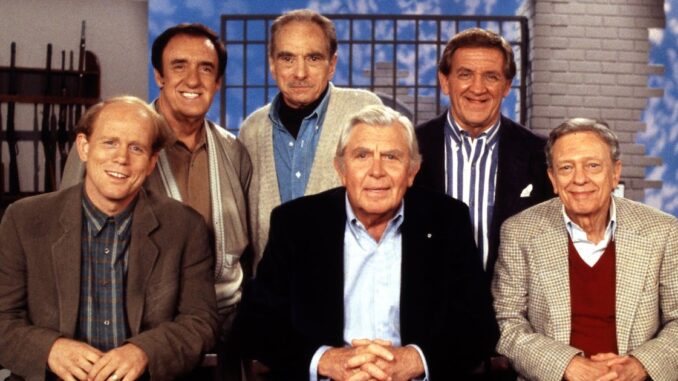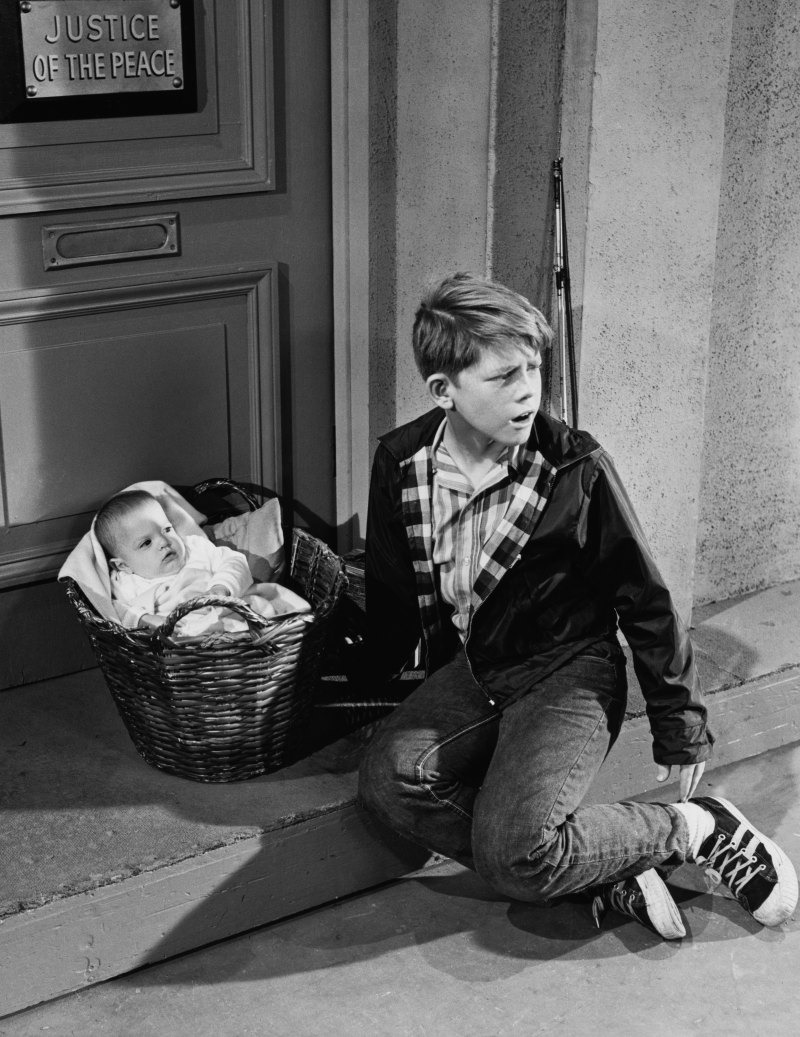
Introduction: A Childhood on Camera, Not All Smiles
When we think of The Andy Griffith Show, we think of small-town charm, front porch wisdom, and black-and-white comfort television. But for a young Ron Howard—just a freckle-faced boy playing Opie—it wasn’t all ice cream and fishing poles. Behind the scenes, he witnessed adult tensions, creative power struggles, and moments that chipped away at his innocence.
Let’s go deep into what really went on behind the scenes of one of America’s most iconic TV shows—and how Ron Howard, one of Hollywood’s most respected directors today, grew up facing realities most kids his age never dreamed of.
The Iconic Show That Hid Real-Life Tension
The Mayberry Illusion
Onscreen, Mayberry was a utopia—free of crime, hate, and real-world stress. But that was a crafted illusion. Behind the scenes, The Andy Griffith Show was shaped by production stress, disagreements, and personal demons.
Hollywood’s Pressure Cooker
Filming a hit show wasn’t easy. Howard later recalled how the stress wasn’t always visible to viewers, but to a perceptive child, it was unmistakable. The pressure to maintain ratings, navigate egos, and deliver clean-cut perfection weekly was immense.
Ron Howard: The Child Star with an Adult Perspective
Growing Up Too Fast
Most kids go to school and come home to play. Ron Howard went to a film set where adults argued, smoked behind cameras, and dealt with business politics. He was surrounded by professionals, but professionalism didn’t always mean kindness or warmth.
Observing Adult Behavior at an Early Age
Howard wasn’t shielded from the uglier aspects of working life. He saw tempers flare, people get fired, and others quietly leave under clouded circumstances. It gave him a crash course in human behavior—and not the pretty kind.
Andy Griffith’s Dual Nature
A Charismatic Lead with a Complex Personality
Andy Griffith, the show’s namesake and star, was charming to viewers—but behind the scenes, he had mood swings. By Howard’s account, Griffith could be both warm and welcoming, or cold and intense depending on the day.
Strained Relationships With Co-Stars
Don Knotts, beloved as Barney Fife, left the show in part because of friction. Griffith’s ambition and creative control sometimes made working relationships complicated—something even a child actor could sense.
Don Knotts’ Exit Marked a Turning Point
The Shift in Tone Post-Barney
When Knotts left, the show’s dynamic changed. The chemistry that made the early seasons sparkle faded, and young Ron could feel it. Even though he was just a boy, he noticed the show wasn’t as fun or light-hearted anymore.

Learning to Navigate Toxic Situations
On-Set Power Dynamics
Ron was quiet and observant. He learned how to read a room before entering it. When tensions rose, he’d know to steer clear or stay quiet—valuable survival instincts in a space filled with grown-up politics.
Being “Just a Kid” Didn’t Protect Him
Though treated kindly by many cast and crew, Howard said he was never completely insulated from the emotional friction on set. He learned early that Hollywood wasn’t always a happy place.
The Emotional Toll of Fame
Losing the Joy of Childhood
Fame at a young age brought its own baggage. Ron didn’t have the typical school experience. He didn’t get to mess up and learn in private. Everything he did was watched, judged, and remembered.
Dealing With the Weight of Expectations
Imagine having to be perfect all the time as a kid. That’s what Ron Howard had to deal with. Every line, every take, every smile—expected to be flawless. That pressure stuck with him.
A Hidden Education in Human Psychology
Watching Adult Insecurities Up Close
Ron Howard wasn’t just acting—he was absorbing. He learned about fear, ego, insecurity, and ambition not from books, but from the adults around him.
Hollywood’s Polished Veneer Cracked Early
The glitz and glamour looked good on the outside, but Howard quickly learned it was just set dressing. Real life behind the camera was more flawed than the Mayberry town square would ever let on.
Ron Howard’s Lifelong Takeaway
A Desire for Creative Control
After watching grown-ups wrestle with decision-making, Howard developed a strong desire for creative control—something that would define his directing career later.
Respect for Honest Storytelling
Rather than replicate Mayberry’s flawless fantasy, Howard’s directing leaned into authenticity. Whether it was A Beautiful Mind or Apollo 13, he sought out real stories with real emotion.
The Andy Griffith Show’s Legacy: Bittersweet for Howard
Pride in the Work, Complexity in the Experience
Ron Howard has said he’s proud of the show and thankful for the opportunity, but he’s also honest about the cost. It wasn’t all joy. It was a real job, filled with real-life adult problems.
Not All Was Ugly—but It Wasn’t All Beautiful
There were great moments of laughter, kindness, and mentorship. But they coexisted with tension, conflict, and the slow erosion of childhood wonder.
Lessons Learned on the Set of a Classic
Empathy Through Observation
Howard’s ability to understand people—one of his greatest directing gifts—was born on that set. Watching adults struggle helped him build empathy from a young age.
Staying Grounded Despite Fame
Unlike many child stars, Howard stayed grounded. That balance came from his supportive parents, but also from seeing how easily fame could unravel adults.
How His Experience Shaped His Directing Style
Calm, Respectful, and Collaborative
Ron Howard is now known for being one of the most respectful, even-tempered directors in Hollywood. That tone didn’t come by accident—it was a direct contrast to what he experienced as a child actor.
Putting People First on Set
He makes sure his sets are safe, welcoming spaces. His childhood in Hollywood taught him what happens when you don’t create that kind of environment.
Conclusion: From Opie to Oscar-Winner, The Journey Wasn’t Easy
Ron Howard’s journey through The Andy Griffith Show wasn’t just a sweet childhood memory—it was a crash course in the complexities of adult life. While Mayberry offered the world a picture of peace, Howard saw the mess behind the curtain. And yet, he used those lessons not as a burden, but as building blocks for an extraordinary career.
He turned early exposure to tension, ego, and fragility into empathy, understanding, and strength. That’s the kind of growth Mayberry never showed on screen—but it was real, and it helped shape one of the most respected creatives in Hollywood.
FAQs
1. Did Ron Howard ever regret being on The Andy Griffith Show?
No, Ron Howard has never expressed regret. He acknowledges the difficulties but remains proud of the experience and what it taught him.
2. What specific adult problems did Ron witness on set?
Ron observed creative disputes, tension between cast members, and the emotional weight that fame and pressure placed on adults around him.
3. How did Andy Griffith treat Ron Howard off-camera?
Andy Griffith was generally supportive of Ron, but Howard later said Griffith could have moody or intense days, making the working environment unpredictable.
4. How did Don Knotts’ departure affect the show and Howard’s experience?
Knotts’ exit changed the chemistry of the show and shifted the tone. Howard noticed the change even as a child and felt the difference in energy.
5. How did these early experiences impact Ron Howard’s directing style?
Ron Howard developed a calm, collaborative directing approach that values emotional honesty, respect, and storytelling rooted in real human experiences.